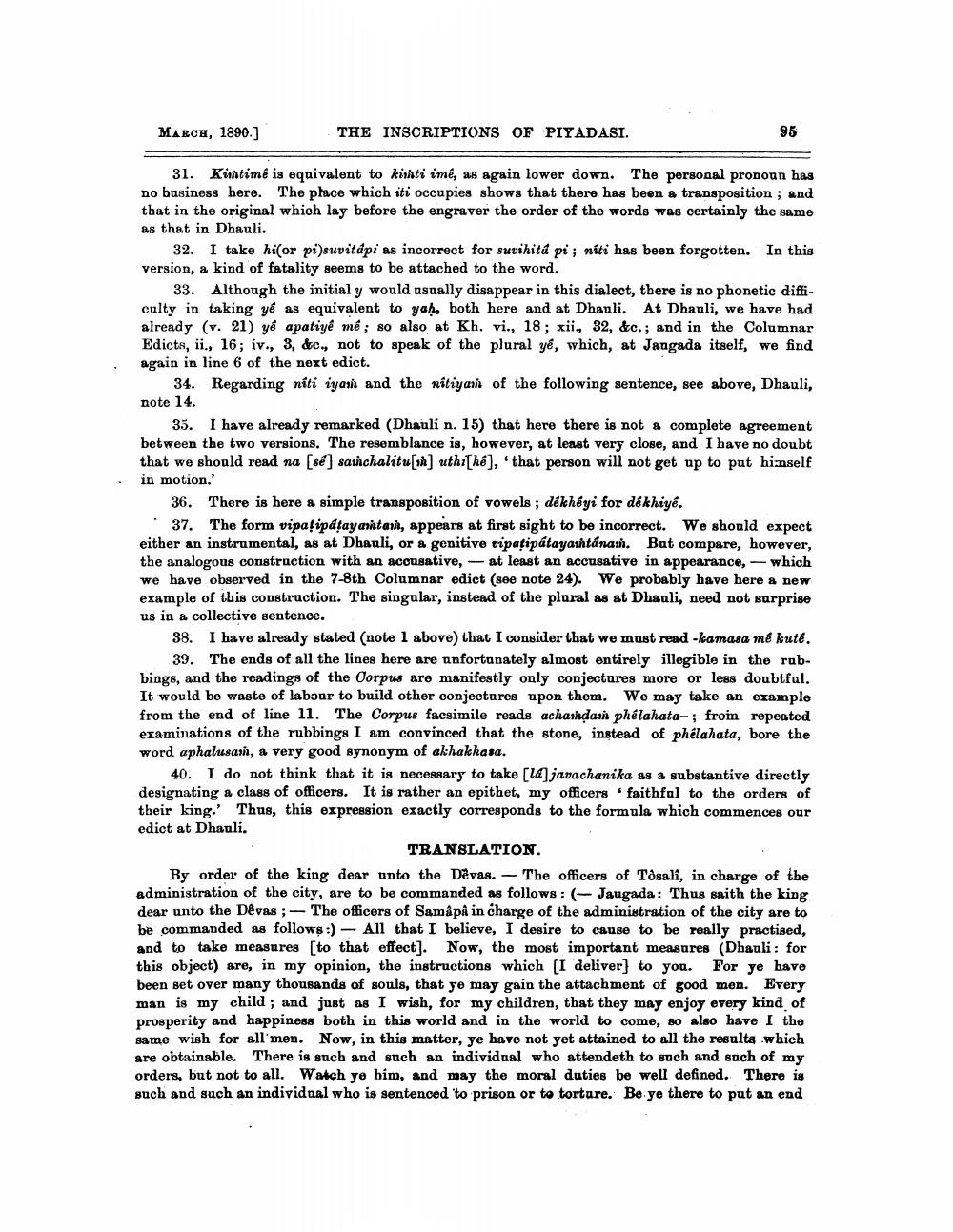________________
MARCH, 1890.)
THE INSCRIPTIONS OF PIYADASI.
95
31. Kintime is equivalent to kirti ime, as again lower down. The personal pronoun has no business here. The place which iti occupies shows that there has been a transposition, and that in the original which lay before the engraver the order of the words was certainly the same as that in Dhauli.
32. I take hilor pi)suvitápi as incorrect for suvihitá pi ; niti has been forgotten. In this version, a kind of fatality seems to be attached to the word.
33. Although the initial y would usually disappear in this dialect, there is no phonetic difficulty in taking yê as equivalent to yah, both here and at Dhauli. At Dhauli, we have had already (v. 21) ye apatiyê mé; so also at Kh. vi., 18; xii. 32, &c.; and in the Columnar Edicts, ii., 16; iv., 3, &c. not to speak of the plural yé, which, at Jangada itself, we find again in line 6 of the next edict.
34. Regarding niti iyan and the nitiyarn of the following sentence, see above, Dhauli, note 14.
35. I have already remarked (Dhauli n. 15) that here there is not a complete agreement between the two versions. The resemblance is, however, at least very close, and I have no doubt that we should read na (s&] sarchalitu[m] uthi[he], 'that person will not get up to put himself in motion,
36. There is here a simple transposition of vowels ; dékhéyi for dekhiye.
37. The form vipafipdayantari, appears at first sight to be incorrect. We should expect either an instrumental, as at Dhauli, or a genitive sipatipátayantánan. But compare, however, the analogous construction with an accusative, - at least an accusative in appearance, - which we have observed in the 7-8th Columnar edict (see note 24). We probably have here a new example of this construction. The singular, instead of the plural as at Dhauli, need not surprise us in a collective sentence.
38. I have already stated (note 1 above) that I consider that we must read -kamasa mé kuté.
39. The ends of all the lines here are anfortunately almost entirely illegible in the rabbings, and the readings of the Corpus are manifestly only conjectures more or less doubtful. It would be waste of labour to build other conjectures upon them. We may take an example from the end of line 11. The Corpus facsimile reads achandau phélahata- ; froin repeated examinations of the rubbings I am convinced that the stone, instead of phélahata, bore the word aphalusan, a very good synonym of akhakhasa.
40. I do not think that it is necessary to take [14]javachanika as a substantive directly designating a class of officers. It is rather an epithet, my officers faithful to the orders of their king. Thus, this expression exactly corresponds to the formula which commences our edict at Dhauli.
TRANSLATION By order of the king dear unto the Devas. - The officers of Tosali, in charge of the administration of the city, are to be commanded as follows: (- Jaugada: Thus saith the king dear unto the Devas; - The officers of Samâpå in charge of the administration of the city are to be commanded as follows :) - All that I believe, I desire to cause to be really practised, and to take measures to that effect]. Now, the most important measures (Dhauli: for this object) are, in my opinion, the instructions which [I deliver] to you. For ye have been set over many thousands of souls, that ye may gain the attachment of good men. Every man is my child; and just as I wish, for my children, that they may enjoy every kind of prosperity and happiness both in this world and in the world to come, so also have I the same wish for all'men. Now, in this matter, ye have not yet attained to all the results which are obtainable. There is such and such an individual who attendeth to such and such of my orders, but not to all. Watch ye him, and may the moral duties be well defined. There is such and such an individual who is sentenced to prison or to torture. Be ye there to put an end




